- Home
- James McBride
Deacon King Kong Page 8
Deacon King Kong Read online
Page 8
The real truth was that their long journey to Brooklyn began in 1951, care of a Colombian worker from the nearby Preston chicken-processing plant named Hector Maldonez. That was the year Hector slipped into New York on a Brazilian freighter, the Andressa. He spent the next six years living the good life in America, before he decided to divorce his wife and childhood sweetheart, who had dutifully remained back home with their four children in their village near Riohacha, in the northern Perijá mountains. Hector was a man with a conscience, and when he dutifully flew back home to explain to his wife that he’d found new love in America, a new Puerto Rican wife, he promised he would continue to support her and the children as always. His Colombian wife begged him to return to their once-blissful marriage, but Hector refused. “I’m an American now,” he said proudly. He neglected to mention that as a big-shot American, he could not have a village wife, nor did he invite her to return with him.
Much angst and arguing followed, complete with swearing, hollering, and tearing out of hair, but at the end, after many assurances that he would continue to provide funds every month for her and their children, his Colombian wife tearfully agreed to a divorce. Before leaving she cooked him his favorite dish, a platter of bandeja paisa. She stuck the carefully wrapped blend of chicken, sausage, and rolls in a brand-new lunch box she had purchased and gave it to him as he left for the airport. He grabbed the whole business as he ran out the door, stuffed a few dollars in her hand, and left for America feeling light and easy, having gotten off scot-free. His plane landed back in New York just in time for him to make it to Brooklyn for his shift at the factory. After working his morning shift, he opened his lunch box to devour the delicious bandeja paisa and instead found the lunch box packed with hormigas rojas asesinas, the dreaded red ants from back home, along with a note that read more or less, in Spanish, “Adios motherfucker . . . we know you ain’t sending no pesos!” Hector yelped and tossed the new lunch box into the long open trough that ran beneath the chicken factory, which sent chicken guts and sludge into a labyrinth of pipes that ran beneath the Cause Houses and out to the banks of the warm harbor. And there, in the agreeable coziness of the pipes and sludge, the ants lived in relative harmony, hatching, devouring each other, and happily indulging in the mice, rats, shad, crabs, leftover fish heads, and chicken guts, along with several other unfortunate live or half-live cats and mongrels from the nearby Cause Houses that wandered into the chicken factory for occasional munching, including a German shepherd named Donald, a favorite of the project’s residents. Apparently the poor creature fell into the polluted Gowanus Canal and nearly drowned in the foul-smelling water. He emerged from the water a mess, his fur colored orange and barking like a cat. He staggered around the bank for a full hour before collapsing. The ants ate him of course, along with other unmentionable creatures that lurked in and around the sludge and waste pipes that ran beneath the chicken factory, the ants surviving fine until each fall, when their inner clocks denoted they make their pilgrimage to the surface to do what every God-worshipping creature from the tiniest cell-sized hatchling in Victoria Falls to the giant Gila monsters that wandered the Mexican countryside did, or should do, or should have done: they sought Jesus, or in this case, Jesus’s cheese, which happened to be in Building 17 of the Cause Houses of the New York City Housing Authority, stored by Hot Sausage, a man who faithfully prayed every month that the Lord would allow him to lay his own sausage beside the tenderloins of Sister Denise Bibb, the best church organist in Brooklyn, in addition to faithfully laying aside several bars of Jesus’s cheese every week for a rainy day, which every year, in the fall, worked to the ants’ benefit.
Of course no one in the Cause paid much attention to the March of the Ants. In a housing project where 3,500 black and Spanish residents crammed their dreams, nightmares, dogs, cats, turtles, guinea pigs, Easter chicklets, children, parents, and double-chinned cousins from Puerto Rico, Birmingham, and Barbados into 256 tiny apartments, all living under the thumb of the wonderfully corrupt New York City Housing Authority, which for $43-a-month rent didn’t give a squirt whether they lived, died, shat blood, or walked around barefoot so long as they didn’t call the downtown Brooklyn office to complain, ants were a minor worry. And no resident in their right mind would go over their heads to the mighty Housing Authority honchos in Manhattan, who did not like their afternoon naps disturbed with minor complaints about ants, toilets, murders, child molestation, rape, heatless apartments, and lead paint that shrunk children’s brains to the size of a full-grown pea in one of their Brooklyn locations, unless they wanted a new home sleeping on a bench at the Port Authority Bus Terminal. But one year a lady in the Cause got fed up with the ants and wrote a letter of complaint. The Housing Authority ignored it, of course. But the letter somehow made its way to the Daily News, which ran a story about the ants sight unseen. The story triggered mild public interest, since anything about the Cause Houses that didn’t involve Negroes running around cockeyed screaming for civil rights was seen as good news. NYU sent out a biologist to investigate, but he got mugged and fled. The City College of New York, desperate to clamber over NYU for public respectability, dispatched two black female graduate students to take a look, but both had finals that year and by the time they arrived the ants had departed. The city’s proud Environmental Action Department, which in those days consisted of hippies, yippies, draft dodgers, soothsayers, and peaceniks who smoked pot and argued about Abbie Hoffman, promised to take a look. But a week later a city commissioner, a first-generation Pole and a key mover in the New York Polish American Society’s annual failed effort to get the City Council to honor that great Polish-Lithuanian general Andrew Thaddeus Bonaventure Kosciuszko by naming something after him other than that half-assed, pothole-filled, rust-bucket shit bomb of a bridge that yawned over Williamsburg, bearing the Brooklyn-Queens Expressway and whatever suicide jumper had the guts to wander up through the veering traffic before leaping off the crusty rails to crash into the poor souls below, wandered into the office, got a whiff of the freshly smoked Acapulco Gold being enjoyed by the hippie commie staffers who were busily engaged in arguing about the virtues of that esteemed early-twentieth-century union-organizing hell-raiser Emma Goldman, and left enraged. He cut the department’s budget in half. The investigator assigned to look into the Cause ants was sent to the Parking Authority, where she collected dimes from parking meters for the next four years. Thus, to the wider city of New York, the ants remained a mystery. They were a myth, a wisp of annual horrible possibility, an urban legend, an addendum to the annals of New York City’s poor, like the alligator Hercules who was said to live in the sewers below the Lower East Side and would leap out from manholes and gulp down children. Or the giant constrictor Sid from the Queensbridge Projects who strangled his owner, then slithered out the window to the nearby Fifty-Ninth Street Bridge, his ten-foot body camouflaged in the girders above traffic, occasionally reaching down at night to pluck an unlucky truck driver out of an open window. Or the monkey that escaped from the Ringling Bros. circus and was said to be living in the rafters of the old Madison Square Garden, eating popcorn and cheering as the New York Knicks got the shit kicked out of them for the umpteenth time. The ants were poor folks’ foolishness, a forgotten story from a forgotten borough in a forgotten city that was going under.
And there they stayed, a sole phenomenon in the Republic of Brooklyn, where cats hollered like people, dogs ate their own feces, aunties chain-smoked and died at age 102, a kid named Spike Lee saw God, the ghosts of the departed Dodgers soaked up all possibility of new hope, and penniless desperation ruled the lives of the suckers too black or too poor to leave, while in Manhattan the buses ran on time, the lights never went out, the death of a single white child in a traffic accident was a page one story, while phony versions of black and Latino life ruled the Broadway roost, making white writers rich—West Side Story, Porgy & Bess, Purlie Victorious—and on it went, the whole business of the white man’s reality lumping
together like a giant, lopsided snowball, the Great American Myth, the Big Apple, the Big Kahuna, the City That Never Sleeps, while the blacks and Latinos who cleaned the apartments and dragged out the trash and made the music and filled the jails with sorrow slept the sleep of the invisible and functioned as local color. And all the while, the ants marched each fall, arriving at Building 17 kicking ass, a roaring tidal wave of tiny death, devouring Jesus’s cheese, moving out of the clock and into the boiler room and into the trash can by the hall door, polishing off whatever leftover sandwiches and bits of cake from the wilted, soggy, uneaten lunches Hot Sausage left behind each afternoon as he and his buddy Sportcoat ignored food in favor of their favorite beverage, King Kong. From there they moved on to more plentiful goods in the halls and supply closets: rats and mice, which were in abundance, some dead, some alive, the mice still trapped in glue traps and tiny cardboard boxes, others expired, having been smashed by Hot Sausage’s hand, the rats crushed by his shovel and lying underneath old carburetors and discarded fenders, amidst brooms and on dustpans, sprinkled with lime for later incineration in the giant coal furnaces that heated the Cause Houses. After supping on them, the ants turned upward, filing in a thick line up the broken toilet pipe to Flay Kingsley’s apartment in 1B, where there was little food or garbage to be found, since Miss Flay’s family of eight actually used apartment 1A across the hall, which had been empty since Mrs. Foy, the sole tenant, died four years previous and forgot to tell the welfare department about it, which created the perfect scenario for the welfare department and housing to blame each other about it—since one department didn’t tell the other. The apartment was quiet. Welfare paid the rent. Who knew? From there the ants moved up to Mrs. Nelson’s apartment, 2C, munching on the old watermelon rinds and coffee grounds she kept in a garbage can for her outdoor tomato garden, then up the waste pipe to 3C, Bum-Bum’s place, which was slim pickings, then across the hallway via outdoor viaduct to Pastor Gee’s place in 4C, which had no pickings at all, since Sister Gee kept a spotless house, then through Miss Izi’s bathroom in 5C, where they sampled all manner of delicious soap from Puerto Rico, which Miss Izi every year forgot to store in glass containers in the fall knowing they were coming, and finally to the outer roof, where they attempted to perform a high-wire act by trooping across a stepladder that connected the roof of Building 17 to the roof of Building 9 next door—where they met their death care of a group of clever schoolboys: Beanie, Rags, Sugar, Stick, and Deems Clemens, the best pitcher the Cause Houses had ever seen, and the most ruthless drug dealer in the history of the Cause Houses.
As he lay in bed in apartment 5G of Building 9, his head wrapped in gauze, his mind fogged by painkillers, Deems found himself wondering about the ants. He had dreamed of them many times since he’d been hospitalized. He’d been home in bed three days, and the fog of painkillers and the constant ringing on the right side of his head had brought on odd memories and vivid nightmares. He had turned nineteen two months before, and for the first time in his life, he found himself unable to focus and remember things. He discovered with horror, for example, that his childhood memories were fast disappearing. He couldn’t remember his kindergarten teacher’s name, nor the name of the baseball coach from St. John’s University who had called all the time. He couldn’t remember the name of the subway stop in the Bronx where his aunt lived, or the name of the dealership in Sunset Park where the car salesman sold him his used Pontiac Firebird and then drove it home for him because Deems himself couldn’t drive. There was so much going on, everything was a spinning whirlwind, and for a kid whose almost-perfect memory once allowed him to collect illegal numbers for the local numbers runners needing neither paper nor pencil, the whole business of losing his past was troubling. It occurred to him, as he lay in bed that afternoon, that the shrill buzz on the right side of his head where what was left of his missing ear now lived might be the cause of the problem, or that if there are a thousand things you should remember in life, and you forget them all but the one or two useless things, maybe those things aren’t so useless. He couldn’t believe how good it felt to remember the dumb ants from Building 17. It had been ten years since he and his buddies had dreamed up wonderful ways to stop them from invading their beloved Building 9. He smiled at the memory. They tried everything: Drowning. Poison. Ice. Firecrackers, aspirin soaked in soda, raw egg yolk sprayed with bleach, cod liver oil mixed with paint, and one year a possum that his best friend, Sugar, produced. Sugar’s family visited relatives in Alabama, and Sugar hid the creature in the trunk of his father’s Oldsmobile. The possum arrived in Brooklyn sick and prostrate. He was tossed into a cardboard box taped shut with an entry hole and placed in the ant path on the roof of Building 9. The ants arrived and obediently climbed into the box and began to politely devour the possum, at which point the possum came to life, writhing and hissing, which caused the frightened boys to toss a glass of kerosene on the box and set it on fire. The sudden whoosh of flames caused panic and they kicked the whole business off the roof, where it landed in the plaza six stories below—a bad idea, since that was sure to bring the wrath of adults of one kind or the other. It was Deems who saved them. He grabbed a five-gallon bucket left on the roof by a work crew and, scampering downstairs, scooped the remnants of the whole business into the bucket and dashed to the harbor, dumping everything at the water’s edge. He became their leader then, at ten, and had remained their leader since.
But leader of what? he thought bitterly as he lay in bed. He turned on his side, groaning. “Everything,” he muttered aloud, “is falling apart.”
“Say what, bro?”
Deems opened his eyes and was surprised to see two of his crew, Beanie and Lightbulb, sitting by his bed staring at him. He had thought he was alone. He quickly turned to the wall, away from them.
“You all right, Deems?” Lightbulb said.
Deems ignored him, staring at the wall, trying to think. How had this started? He couldn’t remember. He was fourteen when his older cousin Rooster dropped out of CUNY and started making big bucks selling heroin, mostly to junkies from the Watch Houses. Rooster showed him how to do it, and bang, five years passed. Was it that long ago? Now he was nineteen, had $4,300 in the bank; his mother hated his guts; Rooster was dead, killed in a drug robbery; and he was lying in his bed without his right ear.
Fucking Sportcoat.
Lying there staring at the wall, the smell of the lead paint wafting into his nostrils, Deems thought of the old man not with rage, but rather with confusion. He could not understand it. If there was one person in the Cause who had nothing to gain by shooting him, it was Sportcoat. Sportcoat had nothing to prove. If there was one person in the Cause who could get away with backtalking him, charming him, yelling at him, calling him names, kidding him, jiving him, lying to him, it was old Sportcoat. Sportcoat had been his baseball coach. Sportcoat had been his Sunday school teacher. Now he’s a straight drunk, Deems thought bitterly, though that’s never affected anything before. As far back as he could remember, he realized, Sportcoat had been a drunk more or less, but more important, he’d been the same—consistent. He never complained, or gave opinions. He didn’t judge. He didn’t care. Sport had his own thing, which is why Deems liked him. Because if there was one single thing in the screwed-up Cause Houses—in all of Brooklyn, for that matter—that Deems hated, it was people who complained about nothing. People with nothing complaining about nothing. Waiting on Jesus. Waiting on God. Sport wasn’t that way. He liked baseball and booze. Real simple. Sportcoat did the Jesus thing, too, Deems noted, when his wife, Miss Hettie, used to make him. But even then he could see the old man and he were the same. They were stuck in Jesus houses.
Deems had long ago decided that Sport was different from the Jesus nuts of his life. Sport didn’t need Jesus. Of course he acted like he did, just like a lot of grown-ups at Five Ends church. But Sportcoat had something that nobody at Five Ends, nobody in the projects, nobody Deems Clemens had known i
n his entire nineteen years of growing up in the Cause Houses, had.
Happiness.
Sport was happy.
Deems sighed heavily. Even Pop-Pop, his grandfather, the only man he’d ever known as a father, had not been happy. Pop-Pop had spoken in grunts and ruled his house with an iron fist, collapsing into his armchair at night after work with a beer in his hand, listening to the radio all night until he fell asleep. Pop-Pop was the only person who visited him when he went to juvy prison. His mother didn’t bother. As if hours of talking about Jesus and the Bible would substitute for a kiss, a smile, a solitary meal together, a book read to him at night. She wore his ass out with her switch for the least offenses, rarely found anything good in what he did, never went to his baseball games, and dragged him to church on Sundays. Food. Shelter. Jesus. That was her motto. “I sling eggs and sugar and bacon twelve hours a day and you don’t even thank Jesus that you got a place to live. Thank you, Jesus.” Jesus my ass.
He wanted her to understand him. She could not. There was no one in his house who could. He wanted to be an equal. He saw how stupid the whole thing was, even as a child, all these people crowded into these shitbox apartments. Even a blind person like Pudgy Fingers could see it. He’d even talked to Pudgy about it, years ago, when they were in Sunday school. He was nine and Pudgy was eighteen. Even though he was a teenager, Pudgy was sent down to stay in Sunday School with the little kids during service because he was said to be “slow.” Deems once asked if he minded. Pudgy simply said, “Nope. The snacks are better.” They were in the basement and some Sunday school teacher was prattling on about God and Pudgy was sitting behind him and he saw Pudgy feeling the air with his hand until his hand landed on Deems’s shoulder and Pudgy leaned over and said, “Deems, do they think we’re retarded?” That surprised him. “Of course we ain’t retarded,” he snapped. Even Pudgy knew. Of course he knew. Pudgy wasn’t slow. Pudgy was smart. Pudgy remembered things that nobody else remembered. He could remember how many singles Cleon Jones of the New York Mets hit against the Pittsburgh Pirates in spring training last year. He could tell you when Sister Bibb playing the organ in church was feeling sick just because of the way he heard her feet on the pedals. Of course Pudgy was smart, because he was Sportcoat’s son. And Sport treated kids like equals, even his own. When Sportcoat taught Sunday school, the Lord’s word was all candy and bubblegum, games of catch played in the church basement with balled-up church programs while the congregation sang and yelled upstairs. Sportcoat even took the class on a Sunday morning “outing” to the harbor once, where he’d hidden a fishing pole, tossing the fishing line into the water while Deems and the other kids played and muddied up their clothes. As for baseball, Sportcoat was a whiz. He organized the All-Cause team. He taught them how to catch and throw a ball properly, how to stand in the batter’s box, how to block the ball with your body if need be. After practice on lazy summer afternoons, he’d gather the kids around and tell stories about baseball players long dead, players from the old Negro leagues with names that sounded like brands of candy: Cool Papa Bell, Golly Honey Gibson, Smooth Rube Foster, Bullet Rogan, guys who knocked the ball five hundred feet high into the hot August air at some ballpark far away down south someplace, the stories soaring high over their heads, over the harbor, over their dirty baseball field, past the rude, red-hot projects where they lived. The Negro leagues, Sport said, were a dream. Why, Negro league players had leg muscles like rocks. They ran the bases so fast they were a blur, but their wives ran faster! The women? Lord . . . the women played baseball better than the men! Rube Foster hit a ball so far in Texas it had to take the train back home from Alabama! Guess who brought it back? His wife! Bullet Rogan struck out nineteen batters straight until his wife took a turn and knocked his first pitch out of the yard. And where you think Golly Honey Gibson got his nickname? His wife! She’s the one made him good. She’d hit line drives at him for practice, the ball traveling like a missile at the height of your face for four hundred feet, so hard he’d jump out the way, yelling “Golly, honey!” If Golly Honey Gibson was any better, he’d be a girl!

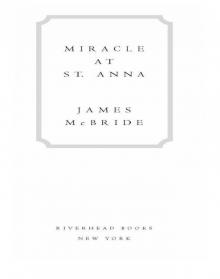 Miracle at St. Anna
Miracle at St. Anna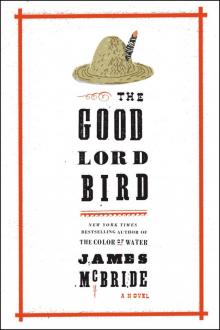 The Good Lord Bird
The Good Lord Bird Song Yet Sung
Song Yet Sung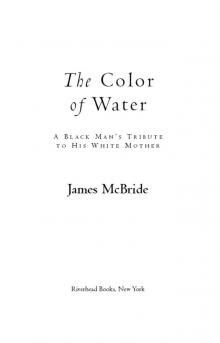 The Color of Water
The Color of Water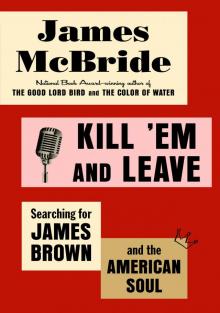 Kill 'Em and Leave
Kill 'Em and Leave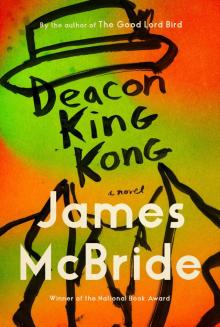 Deacon King Kong
Deacon King Kong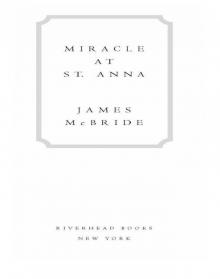 Miracle at St. Anna (Movie Tie-in)
Miracle at St. Anna (Movie Tie-in)